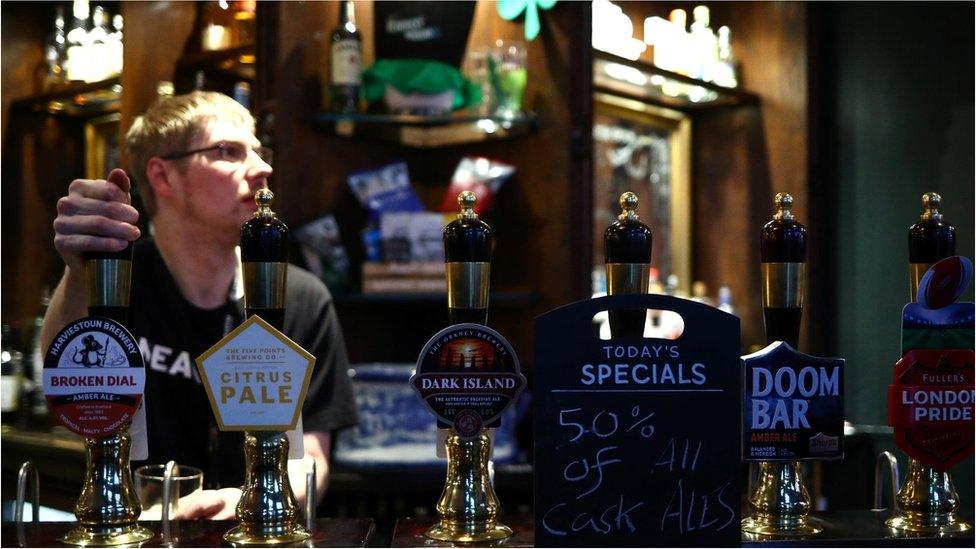Coronavirus: One in five Americans ordered to stay at home
- Published
60 days of coronavirus in the US - in 60 seconds
A number of US states have ordered shutdowns with one in five Americans soon set to be under a "stay at home" order.
Connecticut and New Jersey on Friday joined Illinois and California in ordering residents to stay at home in order to combat coronavirus.
New York State ordered non-essential businesses to close.
The virus has claimed nearly 230 lives in the US and infected more than 18,500 people.
Globally more than 275,000 patients have tested positive for the respiratory illness and more than 11,000 have died.
A ban on non-essential travel across the US-Canada border came into effect at midnight on Saturday.
Speaking at the White House later in the day, President Donald Trump said governors, mayors and citizens were working with "urgency and speed" in what he described as a "war against the virus".
Also at the news conference, Vice-President Mike Pence said he and his wife would be tested after one of his aides tested positive for the virus.
"Neither the president or I had direct contact" with staffer, Mr Pence said, adding that the staffer was "well".
What measures are the US states taking?
On Friday Connecticut, Illinois and New York announced measures directing tens of millions of people to stay at home. The restrictions order most workplaces to close and require residents to remain inside except for trips to grocery stores, pharmacies and gas stations.
In New York, Governor Andrew Cuomo restricted public gatherings and ordered all "non-essential workers" to stay at home. The measures come as confirmed coronavirus cases in New York reached 7,000 - the highest of any US state.
"These provisions will be enforced," Mr Cuomo told reporters. "These are not helpful hints."
Late on Friday, President Trump declared a major disaster in New York State, a move that will release federal funding.
New York and the neighbouring New Jersey, Connecticut and Pennsylvania also issued a joint order on Friday for the closure of all "personal care" businesses, such as hair and nail salons and piercing and tattoo parlours.
All outdoor team sports such as basketball games are also banned under the measures, which take effect on Sunday night.
On Thursday California Governor Gavin Newsom issued a similar order, telling all residents to stay at home. He estimated more than half of the 40 million people in his state would contract Covid-19 in just the next two months.
Images from Los Angeles show some of the city's most famous landmarks completely deserted while the freeways are almost empty.
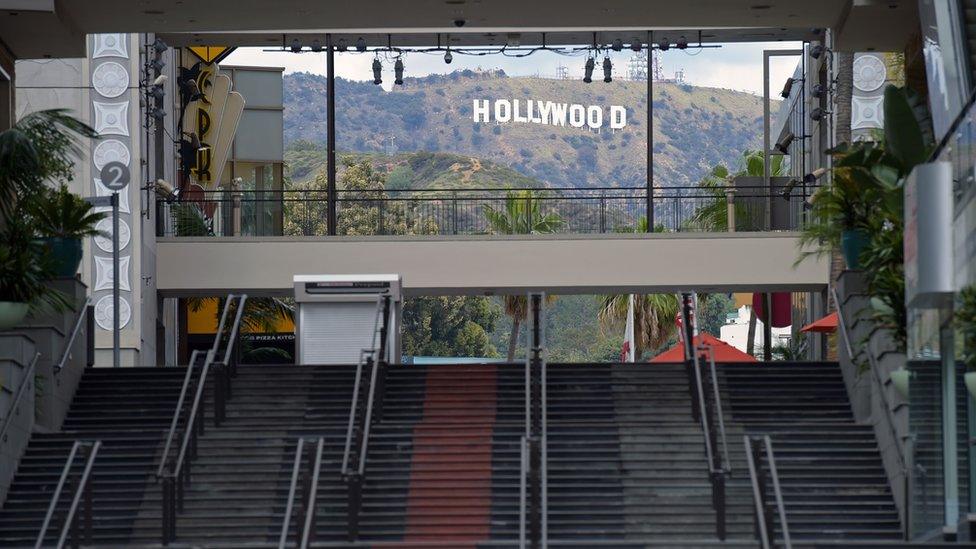
Images from Los Angeles show some of the city's busiest spots left completely empty
Illinois, whose biggest city is Chicago, has also ordered all residents indoors with exceptions to shop for food and medicine or take exercise.
Nevada and Hawaii have also introduced tough new restrictions to reduce social contact.
President Trump has so far ruled out any nationwide lockdown.
He said on Friday: "I don't think we'll ever find [a US shutdown] necessary". He added that the US was "winning" the war against the virus.

Life goes on
By Sophie Long, BBC News, Los Angeles
These may be the most restrictive measures to be put in place in modern Californian history, but in Los Angeles life goes on and the streets are far from empty.
In a city famous for its gridlocked rush-hour traffic, cars are moving more freely past the palm trees on Sunset Boulevard. In Hollywood cyclists still overtake joggers and families still go out for a stroll. But these could all be seen as essential excursions.
People have been told that those who work in critical sectors should still go to work. Busses are still running and grocery stores, pharmacies and banks are all still open.
But many people are staying at home and friends and neighbours are keeping their distance. Restaurants and bars closed their doors days ago, but now all gatherings outside the home have been banned and there is no indication when the restrictions will be lifted.
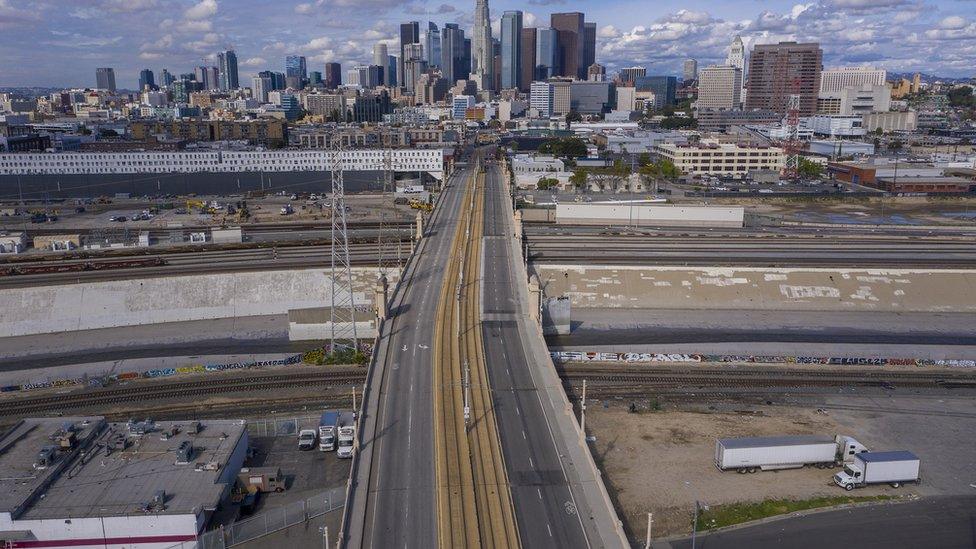
Like a scene from a disaster movie, a road in Los Angeles is almost empty as the lockdown bites
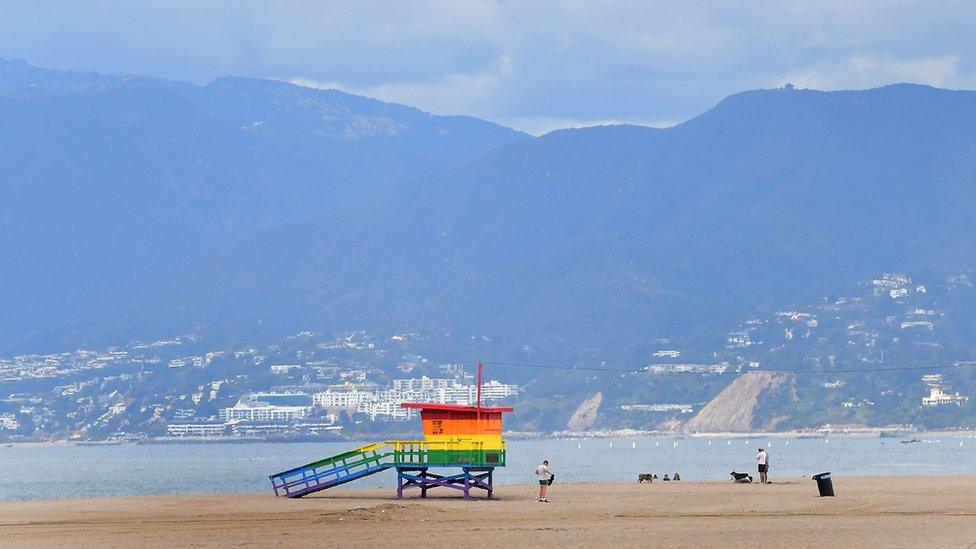
Venice Beach in Los Angeles on the first day of lockdown

Why has the US restricted border traffic with Mexico and Canada?
On Saturday, the US and Canada suspended all non-essential traffic across their shared border, which hundreds of thousands of people normally cross each day, for at least 30 days.
The curbs took effect at midnight, the Canadian government said.
President Donald Trump said on Friday: "In normal times, these massive flows [of immigrants] place a vast burden on our healthcare system, but during a global pandemic, they threaten to create a perfect storm that would spread the infection to our border agents, migrants and to the public at large."
Acting Homeland Security Secretary Chad Wolf meanwhile said both sides wanted "to make sure cargo continues, trade continues, healthcare workers continue to be able to traverse that border".
Similar restrictions have been put into place on the US's southern border with Mexico.
Mexico's Foreign Secretary Marcelo Ebrard said that the measures would reduce the risk of the virus spreading further while not affecting economic activity between the two countries.
Secretary of State Mike Pompeo said US citizens should immediately return home unless they intend to remain abroad for some time.
Students on spring break defy Covid-19 warnings
What's the picture in Canada?
There have been more than 1,000 cases of Covid-19 in Canada, which has barred travel into the country by most foreign citizens. , externalTwelve people have died.
On Friday, Prime Minister Justin Trudeau said asylum seekers crossing into the country on foot from the US would be turned back as part of the border shutdown.
Economic damage from the outbreak is also becoming clear with more than 500,000 applications for unemployment benefits made this week compared to 27,000 in the same week last year.
Air Canada has meanwhile announced plans to lay off 5,100 employees.
The government has announced a C$82bn ($57bn, £49bn) financial package to boost the economy, more than a quarter of which will be used to directly support workers and businesses.
In most provinces across the country, schools have been closed, as have public venues including bars, restaurants and cinemas.
Restrictions on mass gatherings are in place. In the province of Ontario, public events of more than 50 people are banned.

A SIMPLE GUIDE: What are the symptoms?
YOUR THIRD HAND: How do you clean your smartphone?
BORED KIDS: Should you let your children play with others?
GETTING READY: How prepared is the US?
DOING GOOD: Kind Canadians start 'caremongering' trend

How have the president's businesses been affected?
According to US media, Mr Trump's Mar-a-Lago golf club in Palm Beach, Florida, has closed following an order by the state's governor to shut all bars and restaurants.
A spokesperson for the Trump Organization would not confirm the mothballing of the resort, but told CNN: "Various facilities are temporarily closed given local, state and federal mandates.
"We anxiously await the day when this pandemic is over and our world-class facilities can reopen."
Mr Trump's hotel in Las Vegas has already closed after coronavirus restrictions were introduced by the governor of Nevada.
The president's hotels in New York and Washington DC remain open, though more than 200 staff have reportedly been laid off as their occupancy rate plunges amid the pandemic.
The bar and restaurant of the Trump International Hotel in the nation's capital have shut in response to a virus-containment directive from the city authorities.
- Published19 March 2020
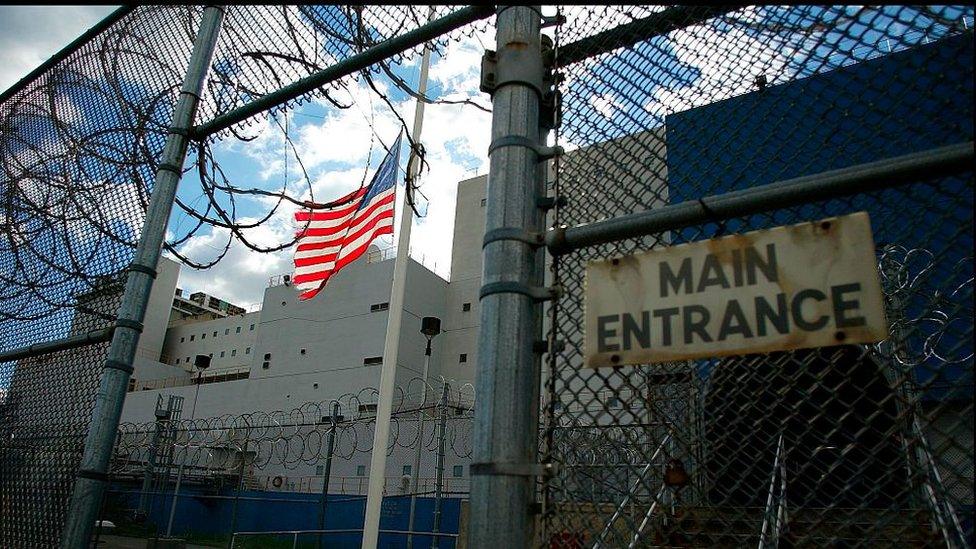
- Published20 March 2020
